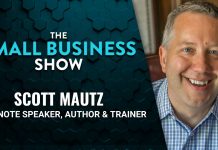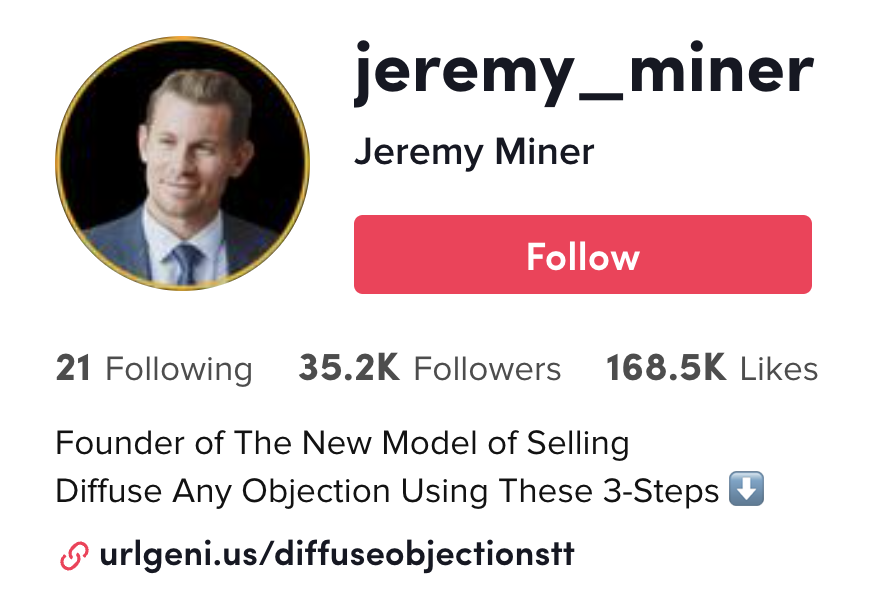Are your sales teams effectively meeting the needs of today’s changing consumers? Today on the Atlanta Small Business Show, we’re pleased to welcome Jeremy Miner, internationally recognized sales trainer and the Founder and Chairman of 7th Level, to discuss how managers and salespeople can adapt to the market. Miner has been featured in Forbes, USA Today, Entrepreneur Magazine, and Yahoo Finance, to name a few. Miner also has a large following on the social platform TikTok (@jeremy_miner), where he shares daily sales tips and motivation.
Jim Fitzpatrick:
So, Jeremy, thank you so much for joining us on the show today.
Jeremy Miner:
Hey, Jim, it’s a pleasure to be on here. I’m going to take all of that, it’s a very nice compliment because my kids say I’m very boring so thank you very much.
Jim Fitzpatrick:
Spoken like true kids. Mine are the same way.
Jeremy Miner:
I love it.
Jim Fitzpatrick:
So I love so for those who may be not as familiar with your story as we are, tell us a little bit about yourself and your journey and a little bit about the 7th Level.
Jeremy Miner:
Oh my gosh. I don’t want to bore everybody to death. So yeah, I mean, as far as TikTok, we’ve only been on there for about six weeks, but it’s been a lot of fun. We do about 200 reels a month, it’s kind of crazy.
Jim Fitzpatrick:
Wow. That’s great.
Jeremy Miner:
200 reels a month between Instagram, which we’ve got tons of followers on there, and TikTok. So it’s a lot of fun. But here’s what I’ll do, I’ll give you a little bit of my background as far as how I’ve gotten sales because I think that relates to really what is necessary if you’re somebody on here, let’s say you’re a business owner, let’s say that you’re some type of sales executive, or leader or manager, or you’re just an individual sales professional yourself. How did it all start?
Jeremy Miner:
So I got into sales about 21 years ago, broke, burned out, college student, probably like a lot of people on here listening to me, you know? And I got my first job selling home security systems door-to-door, 21-year-old kid, and basically, it’s a straight commission job so they hire everybody, about 10% of them will stick because there’s no skin off their back, they’re not paying you anything, right? So if you sell you make money, if you don’t, you’re gone. Basically, the company gives you a script, they take you out in the white van and they drop you off in the middle of a neighborhood and basically kick you out and say, “Hey, go make some sales, we’ll pick you up after dark.” And that was really how I got introduced to the world of selling.
Jim Fitzpatrick:
Yeah.
Jeremy Miner:
I still remember the sales manager when he was training us that very first day. He’s like, “Hey, guys, when they open the door, you got to be really excited about what we’re doing here, you got to be enthusiastic, you got to show them that you’re excited about this and how it’s going to help them and talk about the benefits and the features and blah, blah, blah, blah, blah. And I was like, “Okay, I guess I need to be excited, that somehow if I’m excited that the prospect is magically going to want to buy for me because they’re going to be excited too, right?” Of course that made sense.
Jeremy Miner:
But I noticed from the very first door, that really wasn’t the case, that I got a ton of objections like: “We can’t afford it.” “We don’t need it.” “You guys already came around last month.”
Jim Fitzpatrick:
Right.
Jeremy Miner:
“Your price is too high.” “We already have somebody for that.”
Jim Fitzpatrick:
Sure.
Jeremy Miner:
“I need to talk with my spouse.” “Let me think it over.” And basically, I would say after about seven or eight weeks of all that rejection, I got to a point, and I’ll spare you all the details, but I got to a point where it was like, “Maybe selling just wasn’t for me,” right? If some of you guys on here are listening to me, you might have been at that point in earlier… or maybe even now.
Jeremy Miner:
And I remember the sales manager that picked me up that night and he popped in a Tony Robbins CD. Yes, 20 years ago people listened to CDs. I know it’s kind of a strange concept. And Tony said something like this, and I might be butchering what he said, but he said, “Most people fail for the simple reason they don’t have the right skills that are necessary to succeed.” They don’t have the right skills. Now he went on to say that everyone’s taught skills, but people who fail are the ones who were not taught the right ones. And when I heard that it was like for the first time it was like this heavenly moment, like intervention from God himself, that maybe what the company was training me, what I was learning from what I now called the old sales gurus, maybe they just weren’t the right skills, maybe they were outdated, maybe they didn’t work that well for anymore. And that kind of got me on the path of, “What is the actual right skills?”
Jeremy Miner:
Now at the same time, I was going through all this motion, I was in college and my major, believe it or not, was behavioral science, which people don’t think about but it’s so inclined for salespeople to understand. So I was learning about psychology, I was learning about the brain. Why does somebody make decisions to do one thing or do another, right?
Jim Fitzpatrick:
Right.
Jeremy Miner:
And what I was learning from my behavioral science professors and my psychology professors that the most persuasive way to communicate was over here, but what I was learning from the gurus, they were teaching something that was like way over here.
Jim Fitzpatrick:
Right.
Jeremy Miner:
So there was a massive disconnect. So I was like, “How do I take the theory of behavioral science, working with the brain, why decisions are made or not made, how do I interject that into the sales process?” And that’s where I started developing what is now being called neuro-emotional persuasion questioning, and that stands for NEPQ. So I started learning to use techniques that work with human behavior. So instead of trying to push my prospects forward to my sales process, which as you know, trigger sales resistance and objections, I started learning from human behavior. How do I get my prospects to pull me in where I didn’t have to push? And selling at that point became very, very easy and very, very profitable. So that’s kind of my story in how I got into sales for sure.
Jim Fitzpatrick:
Well, man, you’ve got the attention of a lot of people right now because the number one thing that people will bring up that get out of sales is just that, that friction that they realize it’s not easy, you’re in kind of a rejection business. 70% in many cases, or maybe more, maybe 90% of customers, or I should say prospects, that a lot of salespeople come in contact with will say, “No, we’re not interested,” for one reason or another, “Not interested in your product. Not right now. Maybe the price…” whatever the case might be, you get that rejection. And after a little bit of time, especially for newcomers in the industry, like yourself early on there, it’s tough to get through that. So if you’ve got a technique and process there that people can use to bring that customer to a point where they’re now asking you, “Hey, I want to know more information, I want to find out how I can obtain your product,” boy, you have the attention.
Jeremy Miner:
So in human behaviors, just in Human Behavior 101, we are either triggering the prospect to want to open up and engage with us or we’re triggering them to go into fight or flight mode.
Jim Fitzpatrick:
Right.
Jeremy Miner:
Now, as a sales professional, or as a business owner, sales executive that’s leading teams, is that possibly important to understand what triggers them to either open up or what triggers them to go into fight or flight mode in resistance? That is a massive difference in scaling your company and your salespeople hitting quota, it’s a massive difference. And I think one of the biggest sayings is that a lot of salespeople still are taught, and I don’t know why, but that if somehow they’re enthusiastic to the prospect about what their solutions are, which, “Hey, everybody should be excited about what you sell,” but your prospects don’t care. I hate to tell you this, none of your prospects care how excited you are about your product, your services, your solutions, they only care about what? Themselves, right?
Jeremy Miner:
So if we come across too enthusiastic, especially in the beginning part of that sales process, and we try to talk about our solution way too early in the solution, it triggers a lot of fight or flight mode. You were going to ask me something, go ahead.
Jim Fitzpatrick:
Well, no, I was just going to say that today, a lot of salespeople are dealing with a lot of different situations that are coming in, whether they call, click, or walk into showrooms, or what have you, or businesses today. Many have said that the game of sales has changed since 2019, since pre-COVID, that the world has gone through these last couple of years, and that things have changed, consumers have changed the way they look at products, the way they even look at salespeople today, and salespeople, in kind, have also changed their techniques. What changes have you seen out there and what do you recommend for salespeople today to adapt and to adopt new techniques?
Jeremy Miner:
Well, yeah. That’s a couple of different questions, let’s analyze each one because I don’t want to blend them in together.
Jim Fitzpatrick:
Sure.
Jeremy Miner:
So I think one of the biggest things out there as far as like change is one of our clients says it best in his book. So Brandan Kane, if you guys have ever heard of him, it’s a great book, he’s got a book called Hook Point: How To Stand Out In A 3 Second World. He’s a big influencer, does all the social media for Taylor Swift and Rihanna and MTV-
Jim Fitzpatrick:
Sure.
Jeremy Miner:
… so our clients, we train all of the salespeople, but in his book he says there are over 3 billion, there are over right now, today, there are over 3 billion content creators every day trying to attract, trying to take away the attention of your prospects. I want everybody to think about that, okay? We’re talking about TikTok here. You’re even competing with 13-year-old teenagers on TikTok, you are competing with them taking your prospects’ attention away. Now, do you know how many content creators there were 20 years ago? Take a wild guess. It’s insane. Just 20 years ago. 3 million today. How many were there 20 years ago?
Jim Fitzpatrick:
100,000.
Jeremy Miner:
Less than a million. You’re close, closer to the most. Less than a million, like 900-some-thousand, okay?
Jim Fitzpatrick:
Unbelievable.
Jeremy Miner:
With the information age that we are in right now, with the power of the internet, especially social media, we have to understand… this has been going on, actually, for a long time, it’s not even just the last couple of years, it’s just gotten more worse, it keeps getting worse every year.
Jim Fitzpatrick:
Sure.
Jeremy Miner:
Your prospects are being sold to 24 hours a day, 7 days a week, month after month, year after year. And when I talk about that at events, people are like, “Oh no. No, Jeremy. No, we’re not sold. I might talk to a couple of salespeople a day, I’m not sold all the time.” And I’m like, “Really? I want you to think about it. When you wake up in the morning, what’s the first thing you do?”
Jim Fitzpatrick:
You grab your phone.
Jeremy Miner:
“You grab your phone and you start looking at what? Your social media.” Facebook, I do TikTok maybe. And what do you see? You see ads trying to sell you something, right? You walk up, you go to the bathroom, you go out into the kitchen, you pour some coffee, you’re late for work, you turn on the TV, you see what? Commercials trying to sell you something, right? You get in your car, you turn on the radio to drive to work, you hear ads trying to sell you something. It gets even worse. You drive down the road, you see billboards off to the side trying to sell you something, right?
Jim Fitzpatrick:
Right.
Jeremy Miner:
You look down at your phone during lunch break, you notice that your aunt is posting about her latest, greatest MLM that she’s trying to pitch. See, you’re constantly being sold to 24 hours a day, 7 days a week.
Jim Fitzpatrick:
That’s right.
Jeremy Miner:
And because of that phenomenon, your prospects will no longer be pressured or pushed by pushy salespeople because they know they have many choices to choose the exact product or service you sell. So you’re competing with that wall.
Jim Fitzpatrick:
Yeah.
Jeremy Miner:
So the average human brain will throw up a wall, like I’m talking split second, anytime they feel someone is there trying to sell them something, okay? So what we have to do because of that aspect in our lives that we go through is we have to start thinking and acting like what we call problem finders and problem solvers, not product pushers.
Jim Fitzpatrick:
Mm-hmm.
Jeremy Miner:
Okay. Now, what do I mean by problem finding? I want you guys to think about this for a second, all right? Problem finding means that we’re asking the right questions in that sales process, in that conversation at the right time, the right delivery, that helps your prospects internalize and find problems in their mind that they didn’t realize they have.
Jim Fitzpatrick:
Absolutely. And it makes sense, that’s what, I guess, creates that pull towards that salesperson that addresses their needs a little bit differently, a little bit different than the other salespeople that they come in contact with that does want to just start-
Jeremy Miner:
Yeah.
Jim Fitzpatrick:
… pounding them with all our feature benefits and-
Jeremy Miner:
Yeah.
Jim Fitzpatrick:
… making it more about the salesperson making the sale than-
Jeremy Miner:
Yeah.
Jim Fitzpatrick:
… providing a sound solution to that prospect.
Jeremy Miner:
You got to get rid of the commission breath, like #GetRidOfTheCommisionBreath. We call those product pushers, all right?
Jim Fitzpatrick:
Right.
Jeremy Miner:
You don’t want to be a product pusher, right? When companies bring us in to do sales audits of their salespeople and stuff like that, we see that so many salespeople are like, “Oh, I ask questions.” And when we break it down, it’s like they ask a few questions. Really, I’m like dead serious, like maybe three or four, we call them consultative questions, surface level questions that are just the surface of what’s really going on, and then when they hear a problem they’re ready to pounce, it’s like, they’re pouncing on the problem, right? They’re like, “Oh, well, what’s two problems that keep you awake tonight, John?” or “What type of solution are you looking for?” or “What’s your budget for solving this type of problem?” And then they just pounce, they go into the sales pitch and they talk about the features and the benefits of the product and service and how they have the best this and the best that. Which by the way, doesn’t every single company and every single sales person say they have the best product?
Jim Fitzpatrick:
Without a doubt. Without a doubt.
Jeremy Miner:
How many salespeople or companies say, “Oh yeah, yeah. I mean, we have the fifth best product in the market.”
Jim Fitzpatrick:
Nobody. None of them.
Jeremy Miner:
No one. Everybody-
Jim Fitzpatrick:
A typical comment is, “Nobody is doing what we’re doing.”
Jeremy Miner:
And when you sound like everybody else, just so everybody knows, when you sound like everybody else, because everybody is saying the same thing-
Jim Fitzpatrick:
Right.
Jeremy Miner:
… “We have the best this, we have the best, this, we got the best pricing, the best incentives, the best ownership, the best customer service, the best quality. It’s like, “Wah, wah, wah, wah, wah.” I mean, they’re not even listening to you at that point-
Jim Fitzpatrick:
No, they’re not.
Jeremy Miner:
… they’re tuning it out and your prospects will start to trust you less when you say things like that, and especially if you talk down about your competitors. Why? Because they’re used to every salesperson who’s ever tried to sell them something say the same thing. It’s like taking a bucket of mud and throwing it up against the wall and just hoping and praying that something we’re going to say is going to magically trigger the prospect to want to buy from us. We call that hopium, it’s a drug that so many salespeople and companies take where they hope and pray that something that sounds good that they say is going to cause everybody to want to buy. And trust me, you guys don’t want to take drugs, drugs are good for you.
Jim Fitzpatrick:
That’s right.
Jeremy Miner:
Don’t take the hopium.
Jim Fitzpatrick:
That’s exactly right. Jeremy Miner, Founder and Chairman of 7th Level, internationally recognized sales trainer and speaker. Thank you so much for joining us on the show. I know that our subscribers and viewers will get a lot out of your visit here today. And we’re going to show all the information if you want to learn more about Jeremy Miner, which we suggest you do, this guy is one of the best in the industry. You want to take-
Jeremy Miner:
Well, supposedly. Supposedly, yeah.
Jim Fitzpatrick:
You want to take your sales career or your business to the next level? He’s a great way to start. So thank you so much, Jeremy, for joining us on the show.
Jeremy Miner:
Yeah, Jim. And if they want to learn any of those questions because I know we didn’t have time in this interview, but the best place for them to go to instead of following me all over the place is just go to our Facebook group. It’s free. Go to www.salesrevolution.pro, so go to salesrevolution.pro. You guys can enroll for free. Right when you get in, somebody on my team, it’s just automated, will message you over a free training called the NEPQ 101 Mini-Course, and it’s a breakdown of NEPQ, neuro-emotional persuasion questioning, and we’re going to give you several different questions you guys can use for any industry because we train every industry on the planet now, supposedly. Any industry, it’s going to give you different sales questions you can ask that are going to help you sell more for different situations that you’re going to find yourself in the coming week. So they’re welcome to get some of the free resources there if they want to.
Jim Fitzpatrick:
Well, not only will we show that information on the screen, but we will make it even more convenient. There’s going to be a link right underneath this video that you’re watching right here on our homepage so just click that, it will take you right over. So, Jeremy, thank you so much for making that offer to our audience, I know they get a lot out of it, so thank you.
Jeremy Miner:
Pleasure being on the show. Thanks, Jim.
Jim Fitzpatrick:
Great. Thanks.
The Atlanta Small Business Network, from start-up to success, we are your go-to resource for small business news, expert advice, information, and event coverage.
While you’re here, don’t forget to subscribe to our email newsletter for all the latest business news know-how from Atlanta Small Business Network.









